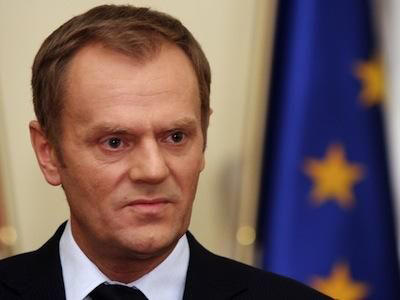EU countries prolong sanctions against Russia over Ukraine

By Amina Nazarli
European Union leaders agreed on extension of anti-Russian sanctions over the turmoil in Ukraine for another half-a-year at the Belgium summit on December 15.
The EU decided to prolong the economic sanctions until mid-2017, to take effect early next week, though some wanted a longer time span. Meanwhile, the current term of sanctions slapped on Russia expires on January 31, 2017.
The decision to prolong anti-Russian sanctions did not come as a surprise, as earlier German Chancellor Angela Merkel and French President Francois Hollande stressed they are for extending sanctions in light of Russia's failure to abide by the Minsk agreements on Ukraine.
The EU linked the economic sanctions targeting specific sectors of Russia in July 2014 in response to Russia's seizure of Ukraine’s Crimean Peninsula and support for the separatists.
The EU, along with the U.S. and Canada, imposed sanctions against Moscow the day after the Crimea referendum.
The sanctions include restrictions on access to international financing, and curbs on defense and energy cooperation with Russia. Some of the Russian officials were also barred from entering EU countries and the U.S., while their assets were frozen.
President of the European Council Donald Tusk said that the EU decision to extend restrictive measures against Russia for an additional six months was not an issue of intense debate at the Thursday EU leaders’ summit, Sputnik reported.
"It was clear that we would prolong the sanctions for six months and some of our colleagues would prefer maybe 12 months, but in fact it wasn’t a discussion," Tusk said at a press conference after the summit.
He added that the possibility of a change in U.S. policy with regard to anti-Russia sanctions under Donald Trump is still not clear.
"It’s still too early to assess responsibly what is the possible policy of the new American administration to Russia, we have too many signals … we have to wait for a formal declaration of the new president [Trump]," Tusk told journalists.
Meanwhile, German Chancellor Angela Merkel explained that the slow implementation of the Minsk agreements on Ukraine is the main reason for EU refusing to ease the anti-Russia sanctions.
Russia has been targeted by several rounds of sanctions inflicted by Brussels, Washington and their allies in light of Crimea’s reunification with Russia in 2014 and due to Moscow's alleged involvement in the internal Ukrainian conflict, a claim that Russia has repeatedly denied.
--
Amina Nazarli is AzerNews’ staff journalist, follow her on Twitter: @amina_nazarli
Follow us on Twitter @AzerNewsAz
Here we are to serve you with news right now. It does not cost much, but worth your attention.
Choose to support open, independent, quality journalism and subscribe on a monthly basis.
By subscribing to our online newspaper, you can have full digital access to all news, analysis, and much more.
You can also follow AzerNEWS on Twitter @AzerNewsAz or Facebook @AzerNewsNewspaper
Thank you!
